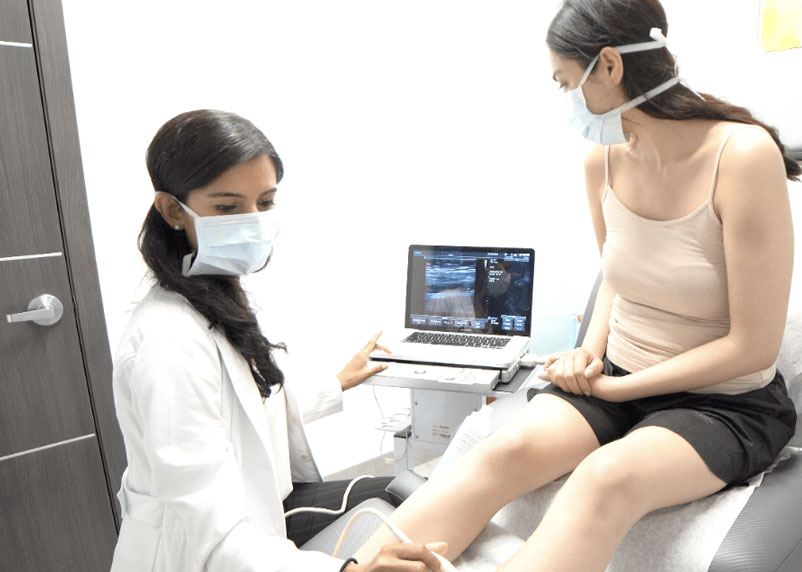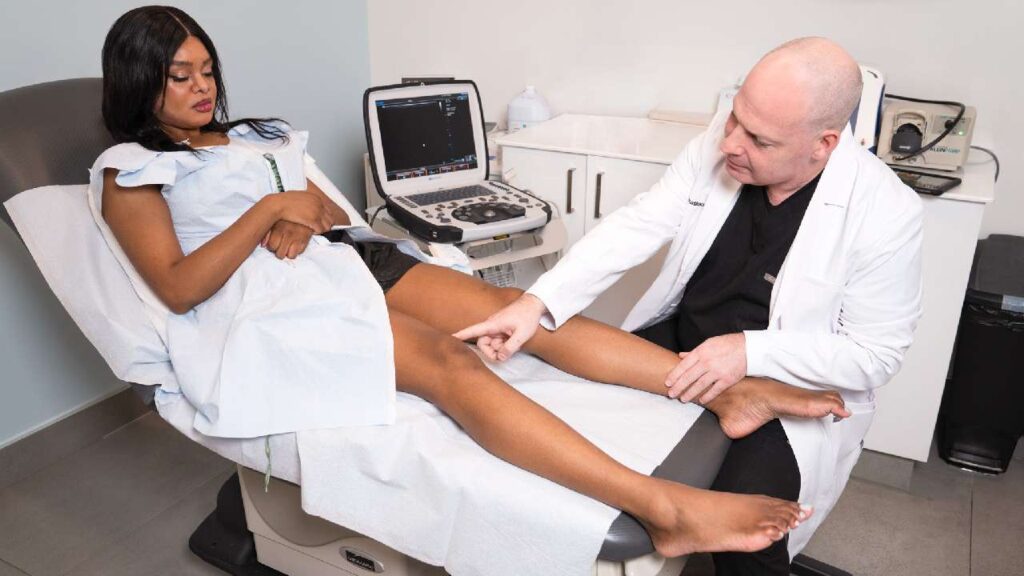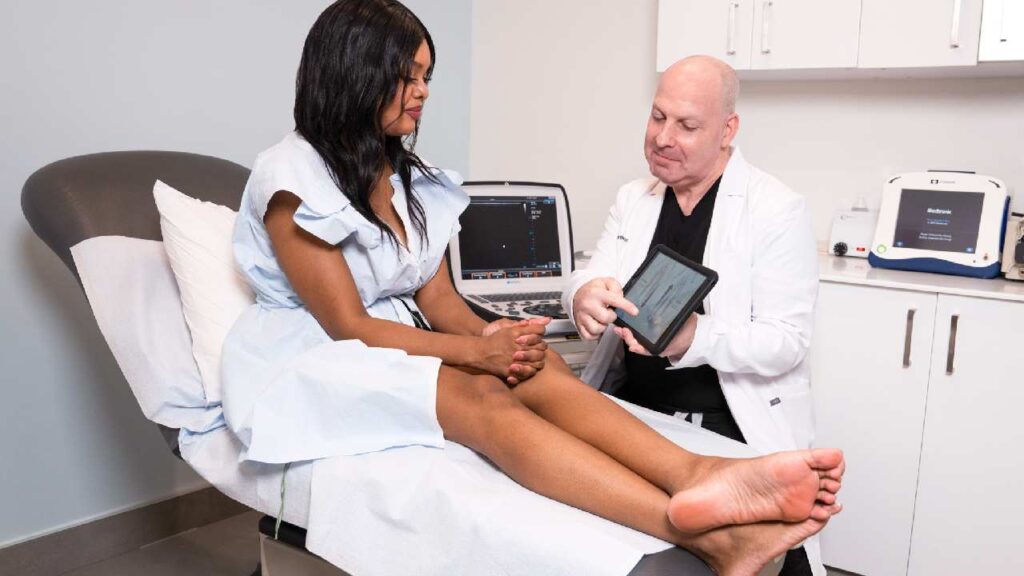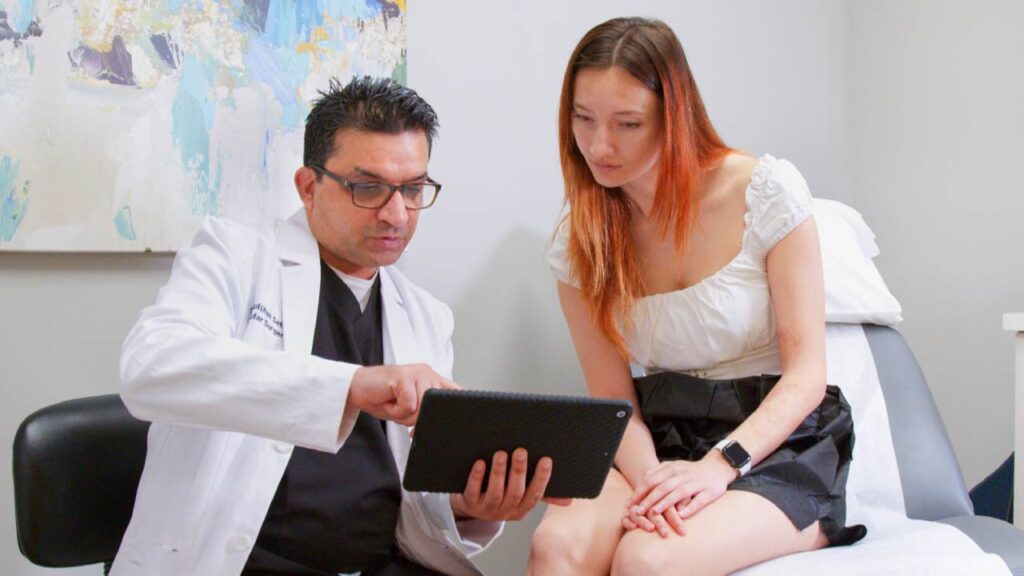10 Signs and Symptoms of Vein Disease
Spider veins and varicose veins are two of the visible clues that someone has vein disease. But there are several symptoms, some of which might not seem correlated to vascular health. Book an appointment with New York vein doctors if you experience any of the symptoms listed below. Vein disease is a serious condition that should not be ignored. It can also be asymptomatic. If varicose veins, spider veins, or Chronic Venous Insufficiency (CVI) run in your family, book a consultation for vein mapping. Our vein doctors identify problems in deeper veins with ultrasound technology before damage arrives at the surface. Here are ten common signs and symptoms of vein disease.
- Leg pain
- Swelling in the lower extremities that worsens as the day goes on
- Leg fatigue
- Cramping or aching in the legs
- Restless legs when you try to relax
- Heaviness in the legs
- Itching
- Venous eczema or venous stasis dermatitis
- Hyperpigmentation on lower limbs
- Slow-healing venous ulcerations

4 Potentially Life-Threatening Complications of Vein Problems
Some people’s vein problems progress beyond the symptoms mentioned above and present a potentially life-threatening complication. If you develop any of these issues, go to the emergency room. While these are rare, they require immediate intervention.
- Deep Vein Thrombosis (DVT)– A deep vein thrombosis, or DVT, is a blood clot in a deep vein. Clots in these blood vessels are more serious than clots in superficial veins because deep veins carry blood to the heart and lungs. If a deep vein thrombosis breaks loose, it can block an essential artery.
- Pulmonary Embolism– A pulmonary embolism is a DVT that blocks a pulmonary artery. This is a life-threatening condition. Red flags include chest pain, coughing up blood, and sudden shortness of breath. You’ll read more about those below.
- Uncontrolled Bleeding– Vein disease produces varicose veins, which are often protuberant. When blood vessels bulge beneath the skin’s surface, they’re susceptible to bumps and scrapes. Since varicose veins stem from excess pressure in a deeper vein, a scraped varicose vein can bleed profusely. If you cannot get the blood to stop promptly, go to the emergency room.
- Infected Ulcerations– Some patients develop slow-healing ulcers on their affected veins. These can be difficult to treat, and they are prone to infection. If you develop a fever, or your ulcer begins oozing, or the area becomes red-streaked or warm, seek immediate medical care.
4 Symptoms of DVT and 9 Symptoms of Pulmonary Embolism
Some people are confused by the difference between a deep vein thrombosis and a pulmonary embolism. A deep vein thrombosis can be fatal, depending on where it’s located and where it travels. A pulmonary embolism poses a more immediate risk of death because it’s a clot that has already traveled to the lungs. Here are four signs of deep vein thrombosis and nine signs of pulmonary embolism.
Deep Vein Thrombosis Symptoms:
- New redness or darkened skin above a vein
- Sudden warmth in the painful area
- Swelling, often in one leg
- Throbbing pain when walking or standing
Pulmonary Embolism Symptoms:
- Sudden shortness of breath
- Coughing, sometimes producing blood
- Chest pain that might worsen with breathing
- Heart palpitations or irregular pulse
- Anxiety
- Dizziness
- Lightheadedness or fainting
- Perspiration
- A drop in blood pressure
5 Health Problems That Result from Untreated Vein Disease
In addition to life-threatening complications, untreated vein disease can cause other health problems. No two people experience vein disease the same way. Some patients have no symptoms. Others have severe symptoms. Many people will develop one of the health problems listed below if they don’t treat their vein disease. Ongoing research is linking venous health to an increasing number of systems in the body. Studies are underway to determine the correlation between veins and osteoporosis, high blood pressure, and more. Here are five known health problems related to vein disease.
- Restless leg syndrome– This is a common complication of vein disease because damaged veins can cause an insatiable urge to move the legs when you’re at rest.
- Disrupted Sleep and Fatigue– Vein disease causes several symptoms that can disrupt sleep. These include leg pain, cramping, swelling, itching, and the restless feelings mentioned above.
- Venous Ulcerations– Vein disease can produce slow-healing wounds that are not only painful, but also affect what people can wear and often impact their self-confidence.
- Venous Stasis Dermatitis– Vein disease causes this itchy rash, also called venous eczema, which can be quite disruptive. It can result in bleeding and infection when it goes untreated.
- Anxiety or Depression– Many patients note that visible vein damage affects their mental health. Some experience anxiety about their vascular system. Others report low self-esteem about the visible damage. If this describes you, don’t suffer in silence. Modern vein treatments are quick, painless, and routinely covered by insurance.
5 Ways New York Vein Specialists Treat Affected Veins
New York vein specialists have several gentle ways to treat vein disease and the affected veins. Most patients do not need surgery. Minimally invasive technology enables vein doctors to close veins inside the body, rather than surgically removing them. These procedures don’t require general anesthesia or hospitalization. Our vein doctors complete them in our vein clinics in 15-30 minutes. Patients don’t need downtime to recover. Most people can resume their usual routine, including moderate exercise, the same day. Here are five of the most common procedures we use for spider veins, varicose veins, and vein disease.
- Liquid Sclerotherapy (Asclera)
- Foam Sclerotherapy (Varithena)
- Radiofrequency Ablation (ClosureFast)
- Vein Adhesives (VenaSeal)
- Mechanochemical Ablation (ClariVein)
3 NY Vein Doctors Who Treat Chronic Venous Insufficiency
We have several vein clinics throughout New York City, Long Island, Brooklyn, Hartsdale, and New Jersey. Each is run by board certified, Ivy-League-trained vein specialists. Vein disease is a serious condition that should not be ignored, but it’s easy to treat with the right doctor. If you visit our Manhattan vein clinics in Midtown or the Financial District, here are three NYC vein doctors who can treat your chronic venous insufficiency. We look forward to meeting you!
- Dr. Sareh Rajaee: Yale-trained, triple board certified in non-surgical vein care
- Dr. Juan Montoya: Yale-trained, expert in both surgical and non-surgical methods
- Dr. Shane Volney: Harvard-trained, expert in minimally invasive procedures





